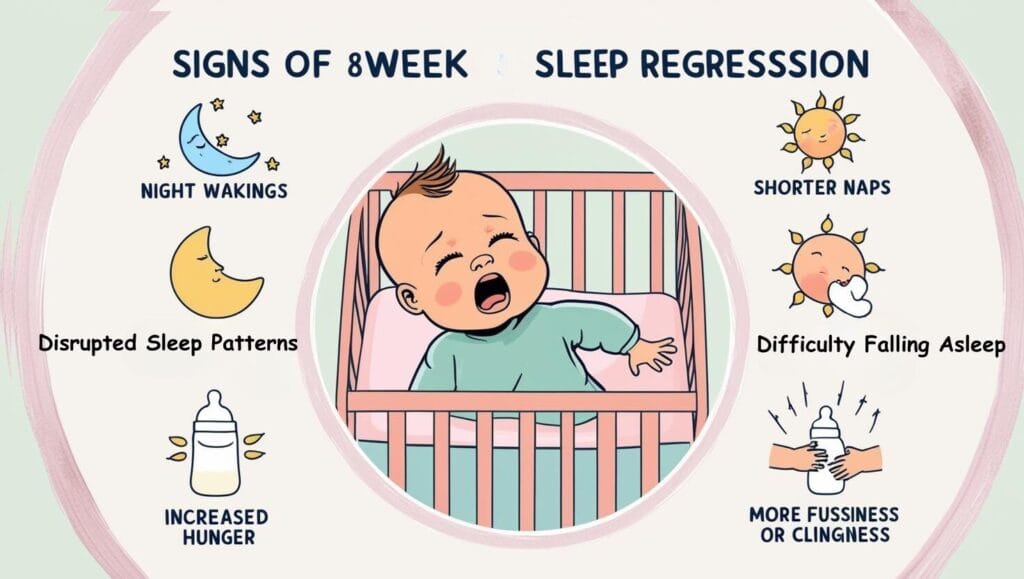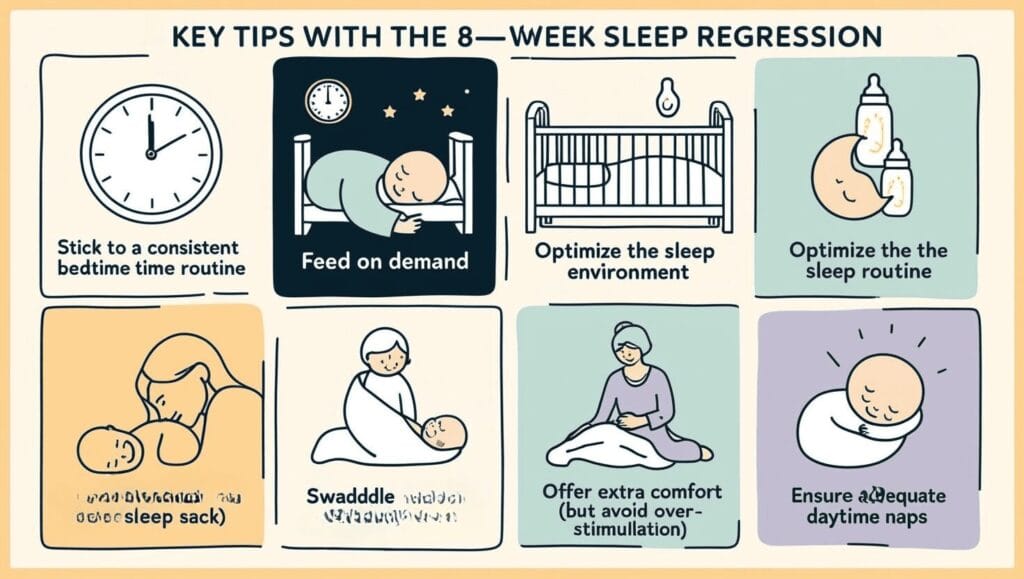The 8-week sleep regression is a challenging phase many parents face as their babies undergo rapid developmental changes. During this time, you may notice that your baby, who once slept soundly, now experiences frequent wake-ups, difficulty falling asleep, and more fussiness than usual. Understanding the causes and patterns of the 8-week sleep regression can help you confidently navigate this tricky stage, ensuring that both you and your baby get the rest you need.
Mastering the 8-week sleep regression is not about fixing a problem, but rather about supporting your baby through this developmental milestone. While it may seem overwhelming at first, proven strategies can help ease the transition and get your baby back to better sleep. From establishing calming routines to understanding the natural changes in your baby’s sleep cycle, this guide will walk you through the best techniques to manage the 8-week sleep regression effectively.
Table of Contents
8-Week Sleep Regression
The 8-week sleep regression is one of the most challenging milestones for new parents. After the initial phase of newborn sleep, which can be irregular and unpredictable, many parents finally start to settle into a somewhat predictable routine. Then, just as you think you’ve got everything under control, your baby’s sleep suddenly turns.
Waking up more frequently during the night, refusing naps, or simply being more fussy is a frustrating reality for many parents of babies around 8 weeks old. You’re likely wondering: Is this normal? And more importantly, how long will this last?
The truth is that this regression is part of your baby’s development and is completely natural. It can, however, be mentally and physically exhausting. But fear not! This guide explores the 8-week sleep regression in detail, from its causes and signs to effective coping strategies and how long you can expect it to last. You’re not alone in this; you can help your baby and yourself through this phase with a few tips and techniques.
For more insights on baby sleep regressions, check out this helpful article from the American Academy of Paediatrics.
What is the 8-week Sleep Regression?
The 8-week sleep regression disrupts a baby’s previously somewhat predictable sleep patterns. Babies at this stage are experiencing rapid brain development and physical growth. These milestones can cause disturbances in their sleep routines, leading to more frequent waking, shorter naps, and more resistance to sleep in general.
During this phase, your baby’s brain shifts from newborn sleep patterns to more adult-like sleep cycles. Babies at 8 weeks start to experience longer sleep cycles, but this transition can often result in more interruptions during sleep as their body and brain adjust.
Sleep regression can not only happen in an 8-week-old baby, but it can also affect a 2-year-old as well. 2-year-old sleep regression is very common as 8 week 8-week-old baby.
Why Does the 8-Week Sleep Regression Happen?
Several key factors contribute to the 8-week sleep regression:
- Developmental Milestones: At 8 weeks, babies process their environment more. This can cause them to wake more frequently as they experience a heightened awareness of sounds, sights, and sensations. They may also develop new motor skills, like increased head control, which can disrupt their sleep.
- Growth Spurts: Around this time, many babies undergo a growth spurt. Your baby might need more feedings or feel hungrier than usual, leading to more nighttime waking as they seek comfort and nourishment.
- Sleep Cycle Changes: In the early weeks of life, babies have shorter sleep cycles, with more periods of light sleep. At 8 weeks, babies’ sleep cycles become more like those of adults, meaning they may experience more wakeful periods during the night as they adjust to the new pattern.
- Increased Awareness: As your baby’s vision improves and they become more aware of the world around them, they may get easily distracted or overstimulated by noises or light, making it harder for them to fall and stay asleep.
Signs of the 8-Week Sleep Regression

How can you tell if your baby is undergoing the 8-week sleep regression? Several key signs may indicate your baby is in this phase:
1. Increased Night Wakings
One of the most common signs of the 8-week sleep regression is an increase in nighttime awakenings. Your baby might have previously been sleeping for longer stretches, but now wakes up more frequently. They may need comfort, feeding, or just the reassurance of your presence to fall back asleep.
2. Shorter Naps
Babies who previously took longer naps may start waking up after only short periods of sleep. Frequent stirring may disrupt these naps, making it difficult for your baby to rest fully during the day. An overtired baby can struggle even more at night, making the sleep regression feel even longer.
3. Difficulty Falling Asleep
Babies who were once able to drift off easily might now fight sleep. This could include more extended fussing, crying, or resistance to being placed in their crib. They may want to be rocked or held more frequently to fall asleep.
4. Increased Hunger
During a growth spurt, your baby may experience an increased appetite, causing them to wake up more frequently at night for feedings. This can disrupt the sleep cycle and increase the frustration for both the baby and the parent.
5. More Fussiness or Clinginess
As babies go through the 8-week sleep regression, they may become more fussy or clingy than usual. They may seek more physical comfort from you during the day and night or cry more frequently when not held or attended to.
6. Disrupted Sleep Patterns
Another sign is the disruption of sleep patterns. Your baby may have previously had a consistent bedtime, but this consistency might be lost during the regression. They may go to bed late one night and early the next or have irregular sleeping habits.
How Long Does the 8-Week Sleep Regression Last?
The 8-week sleep regression generally lasts 1 to 3 weeks. While this can feel like a long period of sleepless nights, rest assured that it is temporary. Most babies settle back into a more predictable sleep pattern after this phase.
However, some babies might experience the regression for a bit longer, especially if they go through an additional growth spurt during this time. However, like in the earlier stages of sleep development, 8-week sleep regression is usually short-lived.
It’s important to note that the 4-month sleep regression is another common sleep disruption that occurs later on. It’s not unusual for parents to experience multiple regressions at different stages, but with each one, the duration typically shortens as babies grow older.
How to Cope with the 8-Week Sleep Regression: Effective Tips and Strategies

While the 8-week sleep regression can feel overwhelming, you can use several proven strategies to make this transition easier for you and your baby. Here are some practical tips for getting through the sleep regression:
1. Stick to a Consistent Bedtime Routine
Establishing a consistent bedtime routine is one of the most effective ways to help your baby through sleep regression. Babies thrive on predictability, so sticking to the same steps every night can help them understand it’s time for sleep. A calming routine might include a warm bath, reading a story, or rocking your baby to sleep.
The more predictable the routine, the more likely your baby will settle into sleep without resistance.
For more tips on bedtime routines, check out this article on BabyCenter: How to Establish a Bedtime Routine.
2. Optimise the Sleep Environment
The right sleep environment is essential during the 8-week sleep regression. Keep the room dark, quiet, and calm to help your baby sleep more soundly. Consider using blackout curtains to block out any light and a white noise machine to drown out external sounds. A dark, quiet space helps signal your baby that it’s time for sleep, and the white noise can soothe them.
3. Feed on Demand
During growth spurts, babies often need to feed more frequently. If your baby wakes up at night, it may be because they’re hungry. Rather than adhering to a strict schedule, feeding on demand helps meet your baby’s nutritional needs and provides comfort during this period. Remember that the more satisfied your baby is during the day, the better their sleep may be at night.
For more on feeding and growth spurts, visit the American Academy of Paediatrics.
4. Swaddle or Use a Sleep Sack
Swaddling is an effective tool for helping babies sleep better during the 8-week sleep regression. It mimics the snug, secure feeling of the womb, which can help comfort your baby and prevent them from being startled awake by their reflexes. If your baby is too old for swaddling, a sleep sack may be a great alternative to keep them comfortable and safe.
5. Offer Extra Comfort (But Avoid Over-Stimulation)
During sleep regression, it’s common for babies to need extra comfort. This can include more frequent rocking, pacifier use, or gently patting your baby. However, be careful not to over-stimulate your baby right before bedtime. Keep the environment calm and soothing to help your baby transition into sleep.
6. Ensure Adequate Daytime Naps
Although it may seem counterintuitive, encouraging your baby to take regular naps during the day can help them sleep better at night. Overtired babies are more likely to resist sleep and have disrupted nighttime sleep patterns. Ensure your baby has a comfortable, quiet environment for daytime naps, which will help them feel well-rested and improve their nighttime sleep.
For advice on daytime naps, visit The National Sleep Foundation.
What About Melatonin for the 8-week Sleep Regression?
Many parents may wonder whether melatonin could be a helpful solution for the 8-week sleep regression. However, it’s generally not recommended to use melatonin for babies under 6 months old. At this age, babies are still developing their natural sleep-wake cycles, and melatonin can interfere with this process. It’s about striking natural, comforting techniques, such as establishing a calming bedtime routine and ensuring a conducive sleep environment.
If you’re considering any sleep aid for your baby, always consult your paediatrician before introducing anything to ensure it’s safe and appropriate for your baby’s age and development.
FAQs About the 8-Week Sleep Regression
Is the 8-Week Sleep Regression a Sign of a Bigger Problem?
The 8-week sleep regression is a normal phase in your baby’s development tied to growth spurts and brain development, which can temporarily disrupt sleep. If your baby shows symptoms like fever, vomiting, or signs of illness, consult your pediatrician.
Can I Sleep Train My Baby During the 8-Week Sleep Regression?
Sleep training is best for babies aged 4 to 6 months and typically not effective for those under 4 months. At 8 weeks, your baby is still adjusting to sleep cycles. Instead of sleep training, focus on providing comfort and consistency during this stage.
What if My Baby’s Sleep Regression Lasts Longer Than Expected?
If your baby’s sleep regression continues for more than 3 weeks or if you see any unusual symptoms, consult your paediatrician for guidance and to rule out any medical issues.
How can I help my baby sleep through the 8-week sleep regression?
To support your baby during this regression, stick to a consistent bedtime routine, create a calming sleep environment, make sure they’re well-fed, and be patient as they adapt to changes in their sleep cycle.
Is the 8-week sleep regression the same as the 4-month sleep regression?
The 8-week sleep regression is different from the 4-month sleep regression. The 4-month regression is usually more intense and lasts longer due to brain development, motor skill improvements, and changes in sleep cycles.
How can I tell if my baby is experiencing the 8-week sleep regression?
Signs your baby might be experiencing the 8-week sleep regression include waking up more at night, trouble falling asleep, increased fussiness, and altered nap patterns.
Should I let my baby cry during the 8-week sleep regression?
Trust your instincts and comfort your baby when needed. While some parents use the “cry-it-out” method, providing reassurance is usually the better approach during this sensitive time.
Is it normal for a baby to start waking up more during the 8-week sleep regression?
It’s normal for babies to wake up more often during the 8-week sleep regression as their sleep cycles change.
Can the 8-week sleep regression affect breastfeeding?
The 8-week sleep regression can lead to breastfeeding challenges, as babies may wake more often and want to nurse for comfort. Maintain a consistent feeding routine to help your baby during this period.
What are some sleep training tips for the 8-week sleep regression?
During the 8-week sleep regression, establish a consistent bedtime routine, minimise overstimulation, and create a calm environment. If sleep training is necessary, opt for gentle methods to help your baby learn self-soothing.
Conclusion: Mastering the 8-Week Sleep Regression
Many parents find the 8-week sleep regression exhausting, but it’s important to remember that it is temporary. Establishing a consistent routine, providing comfort, and ensuring a soothing sleep environment can help your baby through this phase and return to more predictable sleep patterns.
This phase is just one of many milestones in your baby’s development. While it may feel overwhelming at times, it’s a sign that your baby is growing and their brain is developing new skills. Stay consistent, patient, and understanding’ll help your baby navigate the 8-week sleep regression more smoothly. Remember, this is just a temporary phase, and with the right strategies in place, your baby will eventually return to a more restful sleep pattern, allowing you and your little one to get the sleep you need for the next stages of growth.


